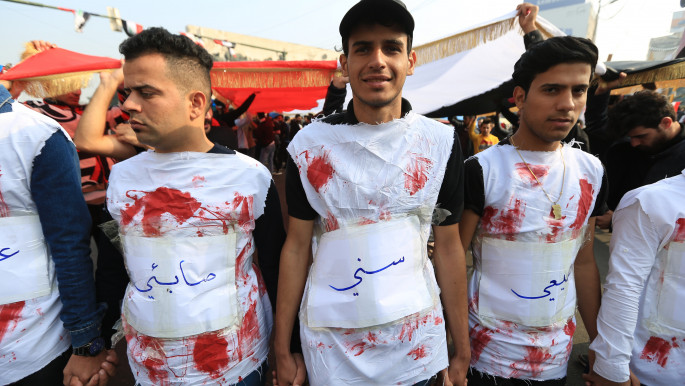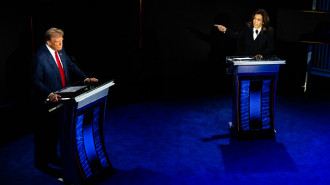Iraq state forces ‘complicit’ in massacre of Baghdad protesters as violence escalates
Iraq state forces ‘complicit’ in massacre of Baghdad protesters as violence escalates
Witnesses in Baghdad revealed that unmarked men dressed in black clothing with AK-47s and PK machine guns opened fire on protesters in the street.
3 min read
Unidentified armed forces - thought to be mercenaries and contracted killers apparently in cooperation with Iraqi national and local security forces - carried out a "brutal spate of killings" in Baghdad's main protest area on 6 December, Human Rights Watch said today.
Estimates put the dead at between 29 and 80, with 137 injured.
"The US, UK, and Iran can’t have it both ways, calling on the Iraqi government to respect the rights of protesters while supporting the Iraqi forces killing protesters or standing by," said Sarah Leah Whitson, Middle East director at Human Rights Watch.
"With killings of protesters continuing day after day, they should end this support," she added.
Witnesses told the human rights watchdog that on the evening of the 6 December seven pickup trucks sped into Al-Khilani Square - occupied by some 1,000 protesters at the time - and as the vehicles drove through the square slowly, gunmen in plain black uniforms and civilian dress with AK-47s and PK machine guns opened fired directly at them.
The witnesses said protesters were gathering peacefully and added that two dozen Federal Police and Iraqi Security Forces (ISF) left by car when the gunmen arrived and returned minutes later once they had left.
The men in the trucks then drove to Al-Senak Garage, a five-storey parking garage just off the square that protesters had been occupying and saw 30 men in civilian dress carrying machetes and sticks storming the building. A few minutes later men in black uniforms opened fire on protesters outside the building.
A protester on the second floor said he heard screams from the first floor, and saw the armed men appear and stab protesters who tried to stand in their way. "I saw many people get injured but all I could think about was how I would get myself out of there," he said.
Another, who saw an armed man throw a protester off the third floor.
"Five of my friends are still missing, and I don’t know if they are dead or were detained. I saw the armed men loading bodies into their buses and trucks an hour before they drove away, at 4:30am," the witness said.
Director Sarah Leah Whitson says it is "clear" Iraqi authorities "outsourced their dirty work against protesters, leaving just as the killings commenced and returning to assist with arrests".
She added: "If they stood by and allowed these armed men to attack protesters or carried out the murders themselves, the Iraqi government forces will be responsible."
According to the Iraqi High Commission for Human Rights, the attack killed at least nine protesters and wounded another 85 civilians.
However, a reliable source from the Baghdad medical community, who has monitored the number of dead and wounded across the city's hospitals, said he had confirmed at least 29 people killed in the attack, from stabbing and bullet wounds, and another 137 injured.
The armed forces have also detained some protesters, who have since disappeared.
The Iraq government have taken what appear to be rather superficial steps towards accountability.
On 1 December the Criminal Court in Wassit convicted two police officers for using excessive force and killing protesters and on 8 December dismissed the head of Baghdad Operations Commander, Major General Qais Al-Muhammadawi.
Activists have blamed a strong of brutal murders in Tahrir Square on Iran-backed militias.
Iraq forces accused of killing protesters in Baghdad.
Iraq's foremost Shia Muslim cleric has also condemned the apparent abduction campaign, urging state control over the use of weapons in his weekly address.
Estimates put the dead at between 29 and 80, with 137 injured.
"The US, UK, and Iran can’t have it both ways, calling on the Iraqi government to respect the rights of protesters while supporting the Iraqi forces killing protesters or standing by," said Sarah Leah Whitson, Middle East director at Human Rights Watch.
"With killings of protesters continuing day after day, they should end this support," she added.
Witnesses told the human rights watchdog that on the evening of the 6 December seven pickup trucks sped into Al-Khilani Square - occupied by some 1,000 protesters at the time - and as the vehicles drove through the square slowly, gunmen in plain black uniforms and civilian dress with AK-47s and PK machine guns opened fired directly at them.
The witnesses said protesters were gathering peacefully and added that two dozen Federal Police and Iraqi Security Forces (ISF) left by car when the gunmen arrived and returned minutes later once they had left.
The men in the trucks then drove to Al-Senak Garage, a five-storey parking garage just off the square that protesters had been occupying and saw 30 men in civilian dress carrying machetes and sticks storming the building. A few minutes later men in black uniforms opened fire on protesters outside the building.
A protester on the second floor said he heard screams from the first floor, and saw the armed men appear and stab protesters who tried to stand in their way. "I saw many people get injured but all I could think about was how I would get myself out of there," he said.
Another, who saw an armed man throw a protester off the third floor.
"Five of my friends are still missing, and I don’t know if they are dead or were detained. I saw the armed men loading bodies into their buses and trucks an hour before they drove away, at 4:30am," the witness said.
 |
|
Protesters stage a protest with symbolic blooded clothes to draw attention to the human rights violations suffered by Iraqi people [Getty] |
Director Sarah Leah Whitson says it is "clear" Iraqi authorities "outsourced their dirty work against protesters, leaving just as the killings commenced and returning to assist with arrests".
She added: "If they stood by and allowed these armed men to attack protesters or carried out the murders themselves, the Iraqi government forces will be responsible."
According to the Iraqi High Commission for Human Rights, the attack killed at least nine protesters and wounded another 85 civilians.
However, a reliable source from the Baghdad medical community, who has monitored the number of dead and wounded across the city's hospitals, said he had confirmed at least 29 people killed in the attack, from stabbing and bullet wounds, and another 137 injured.
The armed forces have also detained some protesters, who have since disappeared.
The Iraq government have taken what appear to be rather superficial steps towards accountability.
On 1 December the Criminal Court in Wassit convicted two police officers for using excessive force and killing protesters and on 8 December dismissed the head of Baghdad Operations Commander, Major General Qais Al-Muhammadawi.
Activists have blamed a strong of brutal murders in Tahrir Square on Iran-backed militias.
Iraq forces accused of killing protesters in Baghdad.
Iraq's foremost Shia Muslim cleric has also condemned the apparent abduction campaign, urging state control over the use of weapons in his weekly address.

![Palestinians mourned the victims of an Israeli strike on Deir al-Balah [Getty]](/sites/default/files/styles/image_684x385/public/2024-11/GettyImages-2182362043.jpg?h=199d8c1f&itok=xSHZFbmc)


![The law could be enforced against teachers without prior notice [Getty]](/sites/default/files/styles/image_684x385/public/2178740715.jpeg?h=a5f2f23a&itok=hnqrCS4x)
 Follow the Middle East's top stories in English at The New Arab on Google News
Follow the Middle East's top stories in English at The New Arab on Google News

![Voters in Michigan [Getty]](/sites/default/files/styles/image_330x185/public/2182490468.jpeg?h=a5f2f23a&itok=XMi_sWGX)
